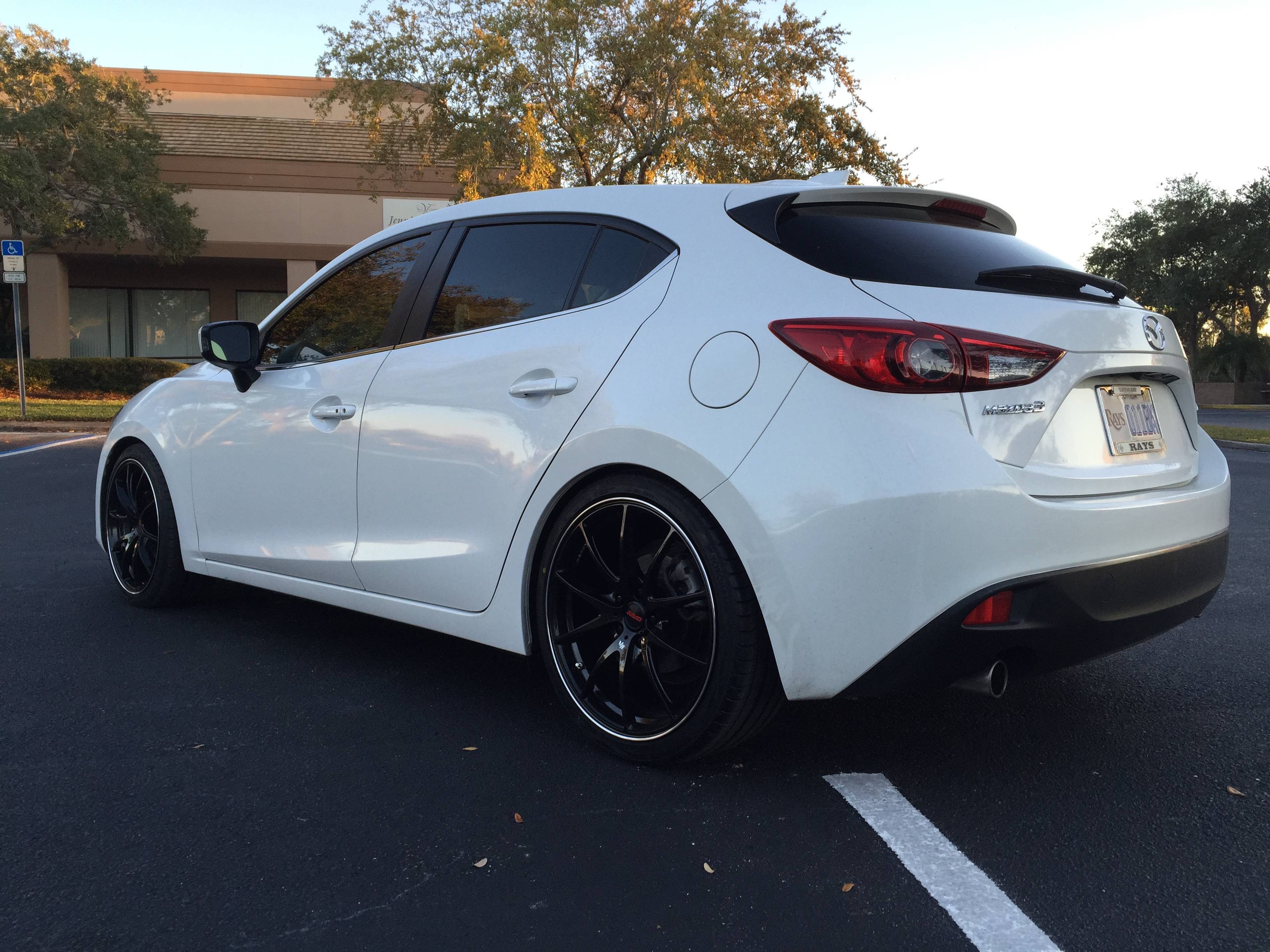You are using an out of date browser. It may not display this or other websites correctly.
You should upgrade or use an alternative browser.
You should upgrade or use an alternative browser.
Show Me Your Wheels
- Thread starter Chris_Top_Her
- Start date
What should the lug nut be torqued to? 85 ft lb?
I know it's been over a month since you asked, but if I remember the shop manual correctly it was between 80-108 ft/lbs. I'm at work now, but can look it up when I get home later if those numbers aren't correct.
I recently saw a black Mazdaspeed3 with purple (not light purple) powder-coated 18" BBS wheels from an Evo X. It looked good to me, but I don't think I would like the combination with a yellow body so much. On the other hand, I have no idea why anyone would care what I think, and my wife is quite adamant that my taste in colours in deficient.I was what you guys would think of yellow '04 Mazda3 Hatch with stock rims purple plasti dipped rims.
I don't know if Plasti Dip is durable enough for wheels. I only heard of Plasti Dip as an automotive finish recently, by references to DipYourCar.com; they treat it as a temporary novelty coating for colour changes and special effects, not a durable permanent finish, but perhaps you're thinking of a different Plasti Dip product. I had not even looked at their wheel section, and I have no idea how well it works. It might be a moderately priced way to try out a colour, if one is prepared to pay for a better finish (or to repeat the Plasti Dip) later.
I think this thread is supposed to be specifically to share photos of wheels, not to launch discussions, so this post and the one I quoted probably belong elsewhere.
Last edited:
elementrace
Member
- :
- 2015 Mazda 5 Door
Forgot to post my setup on this forum. Please pardon my amateur camera skills and lack of editing.
Wheels : 2013 Mazdaspeed3 OEM Wheels.
Specs : 18x7.5 +52.5
Tires: Continental ExtremeContact DWS
Size : 215/45-R18
Rubbing : Nope!
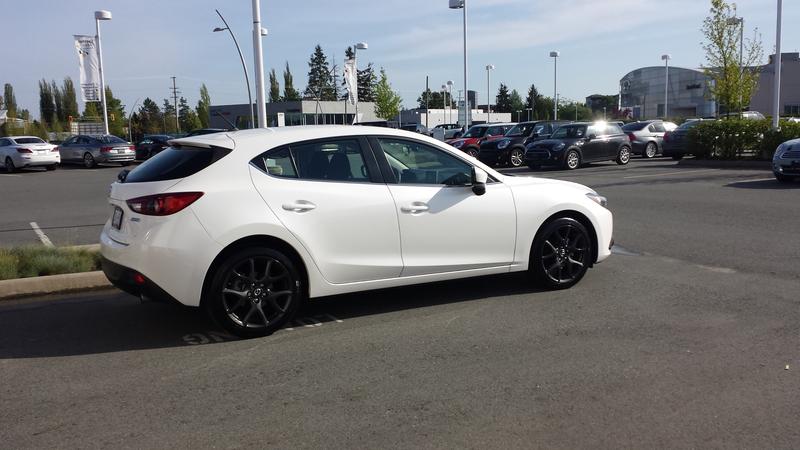
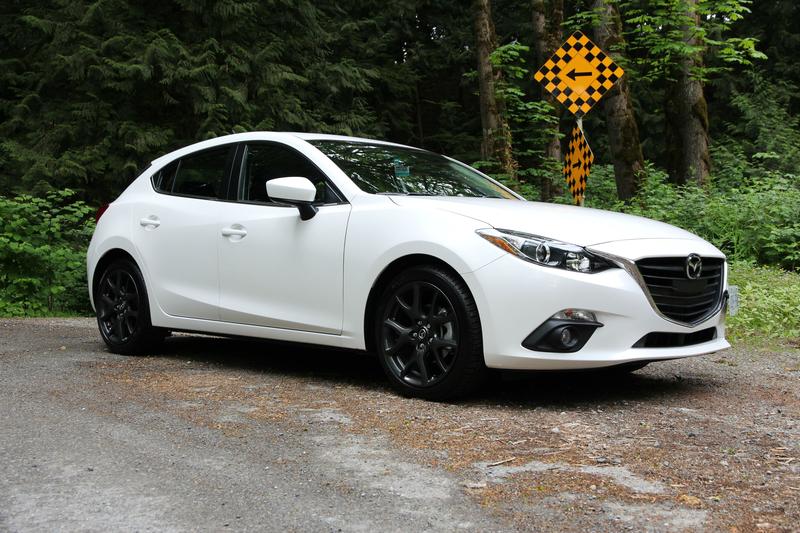

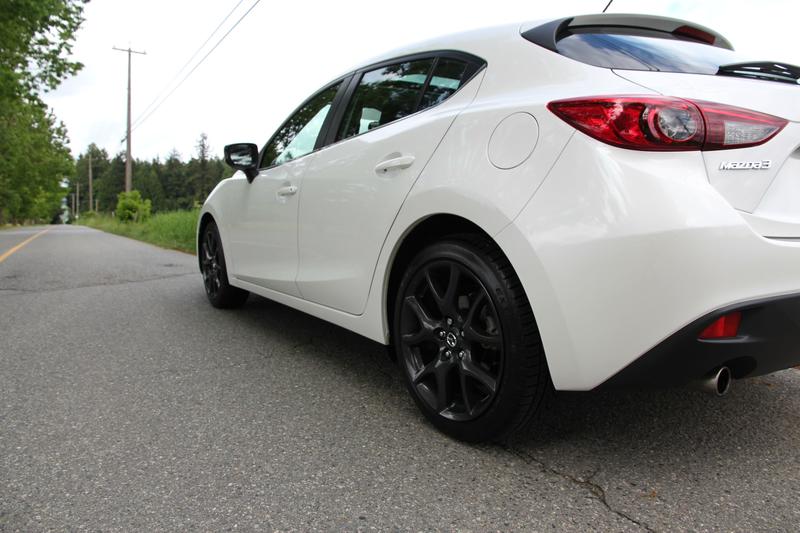
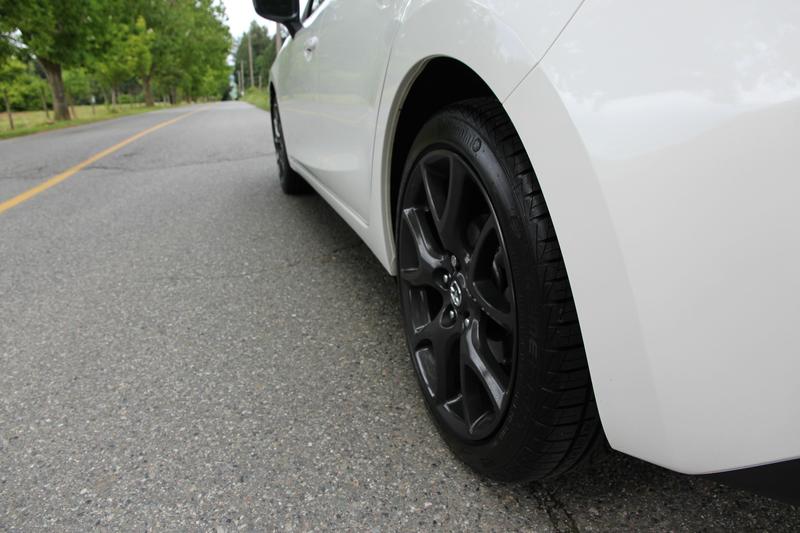
Is this the model with the 2.0L engine? I want to also do the 18" wheels with the 2.0L but was worried about any negative changes in handling or ride? Has the bigger wheels slowed the car's acceleration much or made the ride much more firm?
More in the "discussion which doesn't belong in this photo thread" category:
Unless the wheels are made of lead - or just maybe cast iron - the wheels won't make a perceptible difference to acceleration... as long as the overall tire diameter (and thus effective gearing) is unchanged.Has the bigger wheels slowed the car's acceleration much or made the ride much more firm?
- :
- San Diego, CA
- :
- 2014 Mazda3 S GT auto, 2008 MX5 6-speed
Unless your car had very generous torque output, the wheel weight does make a (detrimental) difference in ride quality, acceleration, and braking. As a general rule of thumb, NEVER get heavier wheels than OEM. In fact, try to buy lighter wheels. OZ and Enkei have some really light 18- inch diameter wheels. The lightest OZs shown in tirerack.com are 16.3 lbs. Of course, you pay for lightness. Find out what your 16s weigh and stay at or below that weight.
Certainly, higher unsprung weight hurts suspension performance, and thus both handling and traction over bumps (regardless of engine torque).
As for acceleration and braking: if the overall tire diameter is unchanged, increased wheel weight amounting to a couple of percent of the vehicle weight is not going to matter. There is a commonly believed myth that the flywheel effect of heavier wheels is a major issue, but for reasonable wheels (not, as I said, lead or cast iron) it's no big deal. The kinetic energy stored in wheel rotation is far less than the kinetic energy stored in forward motion (because the mass of the wheel is not all out at the outer tire diameter), and the wheels are only a few percent of the vehicle mass.
The myth of big acceleration and braking effects seem to come from the idiotic monster wheel and tire setups used for style on SUVs and pickups, where the overall diameter is significantly increased. This hurts acceleration due to taller overall gearing, and hurts braking by putting the brakes at an increased mechanical disadvantage.
As for acceleration and braking: if the overall tire diameter is unchanged, increased wheel weight amounting to a couple of percent of the vehicle weight is not going to matter. There is a commonly believed myth that the flywheel effect of heavier wheels is a major issue, but for reasonable wheels (not, as I said, lead or cast iron) it's no big deal. The kinetic energy stored in wheel rotation is far less than the kinetic energy stored in forward motion (because the mass of the wheel is not all out at the outer tire diameter), and the wheels are only a few percent of the vehicle mass.
The myth of big acceleration and braking effects seem to come from the idiotic monster wheel and tire setups used for style on SUVs and pickups, where the overall diameter is significantly increased. This hurts acceleration due to taller overall gearing, and hurts braking by putting the brakes at an increased mechanical disadvantage.
- :
- San Diego, CA
- :
- 2014 Mazda3 S GT auto, 2008 MX5 6-speed
Well, you can dismiss this "myth" all you want, but I can attest to seat-of-the-pants differences in acceleration and ride when reducing wheel weight by 8 lbs, each. It is real and noticeable.
As Chibana noted:
As Chibana noted:
Today I had my new wheels (w/ OEM tires) put on. The difference in weight is quite noticeable, both when carrying them and when driving them. I couldn't believe how heavy the OEM wheels with Michelin Xi3 winter tires felt carrying them to the shed after carrying the OZ Racing wheels with OEM tires from the shed. I can believe that the OEM wheels may very well weigh 27lbs. each.
Driving with the new wheels was fantastic. Part of the better steering response was undoubtedly going from winter to all-season tires, but there was no doubt the car felt better than it did when I bought it. Steering response and precision are excellent. The tires now spin so easily at launch that today I didn't even go past the kick-down switch (in sport mode) and the front tires were spinning wildly. I'm impressed with Mazda for allowing this much tire spin with traction control enabled. It results in quicker acceleration to allow some wheel spin in a car like this. This car is such a blast to drive, and to top it off, even with having some fun on the way home, from the gas station on the other side of town to home I averaged 27.5mpg in purely city driving.
I agree about the ride; also, steering feel improvement is a good point.Well, you can dismiss this "myth" all you want, but I can attest to seat-of-the-pants differences in acceleration and ride when reducing wheel weight by 8 lbs, each. It is real and noticeable.
As Chibana noted:
The quoted post is all about wheel control, which indeed is better with lower unsprung weight and lower wheel rotational inertia. The described change in acceleration is entirely about traction - accelerating the mass of the wheels isn't a significant factor. Once the launch phase is over, the wheel mass won't make a meaningful difference. Since I don't drag race, the launch matters very little to me... and that's probably true for most people who chose a Mazda3 rather than a Mustang. I also find it interesting that his tires spin more easily now, and this is seen as an advantage...
Here's the relevant part of the quote again, but linked for context:
Although Chibana's profile says 2009 RX8, these wheels and tires are on his 2014 Mazda3 Sport GT....Part of the better steering response was undoubtedly going from winter to all-season tires, but there was no doubt the car felt better than it did when I bought it. Steering response and precision are excellent. The tires now spin so easily at launch that today I didn't even go past the kick-down switch (in sport mode) and the front tires were spinning wildly. I'm impressed with Mazda for allowing this much tire spin with traction control enabled. It results in quicker acceleration to allow some wheel spin in a car like this.
Once the launch phase is over, the acceleration effect is just a matter of kinetic energy storage in the rotating wheels and tires. This will not be significant, and after some searching I can only find confirmations that no one has quantitative evidence to the contrary. Many discussion references indicate that Grassroots Motorsports ran this test twice - with a Mustang reported in 2002 or 2003 and with a Miata reported in June 2011 - each time finding only a fraction of a second of quarter-mile acceleration time difference, or about the couple percent or less that a rational analysis would predict. The articles are not online, and I have not pulled the paper copies yet. I also found one amateur but relatively well-done test which shows no statistically significant difference: http://www.nsxprime.com/forum/showt...t-wheels-Acceleration-Tests-and-their-results
Reducing wheel weight will improve ride and handling, improving feel and even (to a lesser extent) performance.
Grassroots Motorsports settled the question about wheel weights and acceleration in a recent issue where they did thorough measurements on a (first gen, I believe) Miata. They had done a previous test with a heavier, more torque-ful car, and found little or no difference. They theorized that a drop in wheel weight might result in a measurable difference in acceleration in a light car with less power and torque. Therefore, the first gen Miata. Their tests indeed found a significant difference. I seem to recall a 0.6s drop in 0-60mph time going with wheels that were 11 lbs. lighter, each (same size, and same tires).
Our Mazda3s are heavier and more torque-ful (at least, the 2014+ 2.5L certainly is), so the 10 pound-per-wheel I dropped will not cause that kind of drop in 0-60 times, but it is certainly noticeable. This difference was actually more apparent when I went back to my OEM wheels a couple of weeks ago, although I suspect the winter tires (Michelin X-ice Xi3) are also heavier than the OEM tires currently on my OZ Racing wheels. The difference hit me when I went to pass a slower moving vehicle on the expressway from 68 mph. When I got into the left lane to pass and hit the gas to pass before traffic behind me caught up to me (like everyone should do but doesn't), I was stunned how slow the car felt. The heavier wheel and tire combination in my case makes an obvious difference, and if anything, the car should be making more power in the much colder weather we've been having.
FYI, my 2009 RX-8 has even cooler wheels, forged ones by Rays Engineering!
Our Mazda3s are heavier and more torque-ful (at least, the 2014+ 2.5L certainly is), so the 10 pound-per-wheel I dropped will not cause that kind of drop in 0-60 times, but it is certainly noticeable. This difference was actually more apparent when I went back to my OEM wheels a couple of weeks ago, although I suspect the winter tires (Michelin X-ice Xi3) are also heavier than the OEM tires currently on my OZ Racing wheels. The difference hit me when I went to pass a slower moving vehicle on the expressway from 68 mph. When I got into the left lane to pass and hit the gas to pass before traffic behind me caught up to me (like everyone should do but doesn't), I was stunned how slow the car felt. The heavier wheel and tire combination in my case makes an obvious difference, and if anything, the car should be making more power in the much colder weather we've been having.
FYI, my 2009 RX-8 has even cooler wheels, forged ones by Rays Engineering!
Improved feel is good. Improved performance requires measurement. 0.6 seconds over the 0-60 time of a first-gen Miata isn't much (especially for a huge relative wheel weight change), and may be entirely in the launch... but I will read the article when I find it (I don't have a copy, my local library doesn't carry GRM so I need to check downtown, and I'm not paying GRM for a whole print issue at double the newstand price just to read one article).
I would argue 0.6s is pretty damn huge, myself. You won't get that large a gain with most simple bolt-on parts. I'm not sure where you're getting this "at launch" stuff, either. This is basic physics of rotational inertia. That inertia doesn't go away after launch. As long as you're accelerating, it will be a factor. I have B.S. and M.S. degrees in physics, so I know a thing or two about inertia....
- :
- San Diego, CA
- :
- 2014 Mazda3 S GT auto, 2008 MX5 6-speed
I agree with Chibana - 0.6 seconds is a significant 0-60 MPH drop. That would easily make our cars faster than MX5s, which have attained 0-60 times of 6.6 seconds.
Remember too, that as wheel diameters increase, tire aspect ratio decreases. While lower profile tires tend to sharpen steering response, they also worsen the ride (even if wheel/tire weight has remained the same). If you retain the same diameter and lower the wheel weight, the ride can improve, substantially.
Remember too, that as wheel diameters increase, tire aspect ratio decreases. While lower profile tires tend to sharpen steering response, they also worsen the ride (even if wheel/tire weight has remained the same). If you retain the same diameter and lower the wheel weight, the ride can improve, substantially.
Well, keep in mind that for the 10 pound-per-wheel drop I made, the drop in 0-60mph time is going to be significantly less than 0.6s because the 2014 Mazda3s GT is much heavier and makes more torque than the NA Miata. If I had to pull a number out of my ass, which is exactly what I'm doing, I would think maybe a drop of 0.2 or 0.3s might be expected in my case.
- :
- San Diego, CA
- :
- 2014 Mazda3 S GT auto, 2008 MX5 6-speed
Combine that with a higher flowing intake and exhaust and that 0-60 in 6.6 might just be doable. However, I do notice that in sport mode, intake roar is more pronounced (audibly) with the OEM intake. It can certainly be addictive.
Yes, that's significant, if it is real (I haven't seen the reproducibility of the test results). All I'm saying is that if it is accurate, it is not all due to reduced wheel rotational inertia.I would argue 0.6s is pretty damn huge, myself.
To get those degrees, you had to run the numbers. The kinetic energy of the rotation of the wheels would be equivalent to much less than the kinetic energy of the forward motion, so the reduction in kinetic energy (to reach any given speed) would be much less than that of reducing the weight by 80 pounds total (given four wheels at 10 pounds reduction each)... or a couple percent of the vehicle mass. That means a couple percent reduction in acceleration time, if acceleration is power-limited - much less than 0.6 seconds. If you find the car launches better, that's a traction issue, and a potential explanation for a larger time improvement.I'm not sure where you're getting this "at launch" stuff, either. This is basic physics of rotational inertia. That inertia doesn't go away after launch. As long as you're accelerating, it will be a factor. I have B.S. and M.S. degrees in physics, so I know a thing or two about inertia....
Captaingnarnia_
Member
- :
- 2002 Mazda Protege5
OEM g35 rims self painted bronze
18x8 +30
Using a 5mm spacer to accommodate the difference in hub bore.
Fenders rolled and wrapped with 215/40/18 tires

18x8 +30
Using a 5mm spacer to accommodate the difference in hub bore.
Fenders rolled and wrapped with 215/40/18 tires

New Posts and Comments
- Replies
- 96
- Views
- 3K
- Replies
- 11
- Views
- 412

